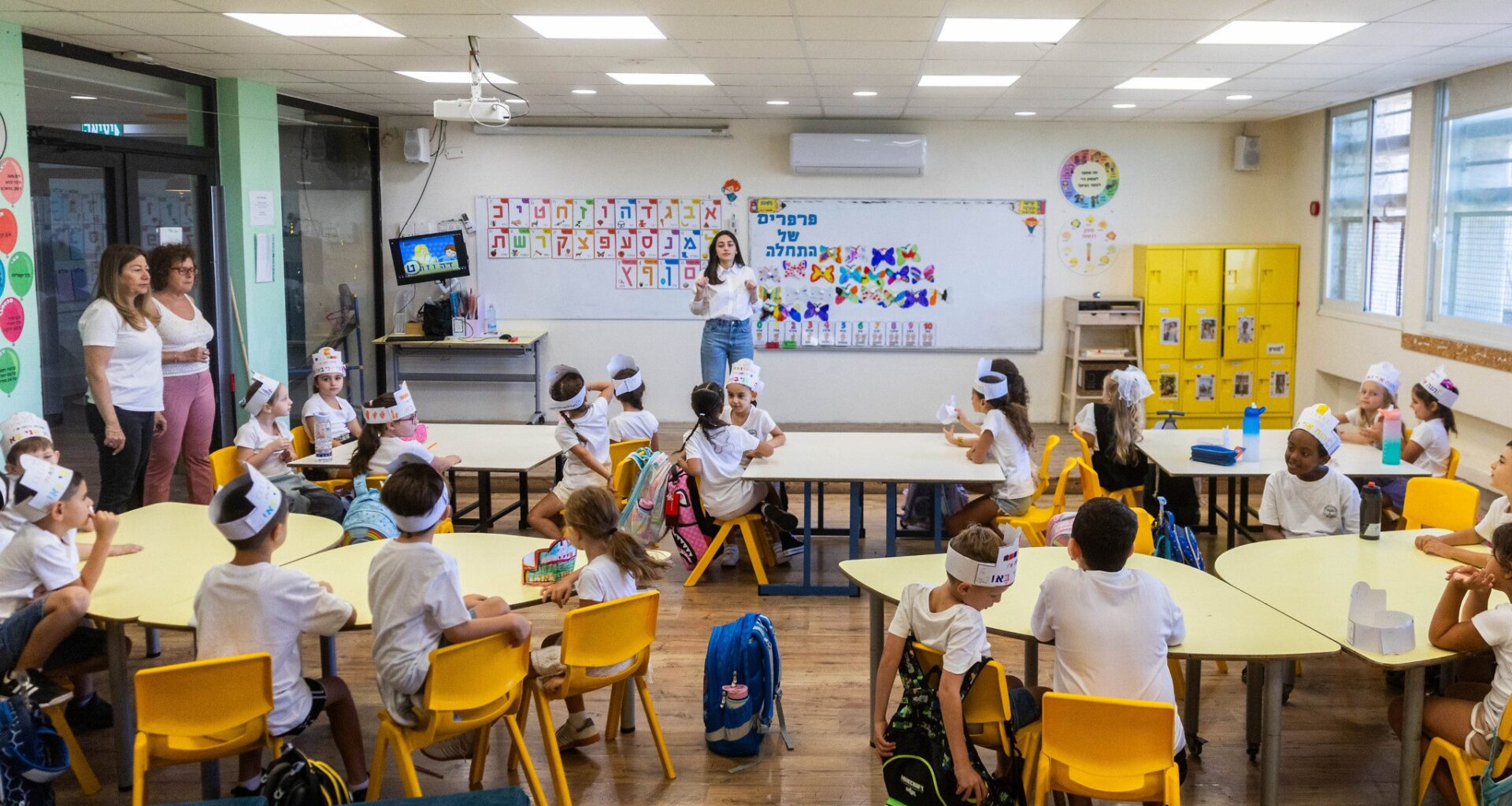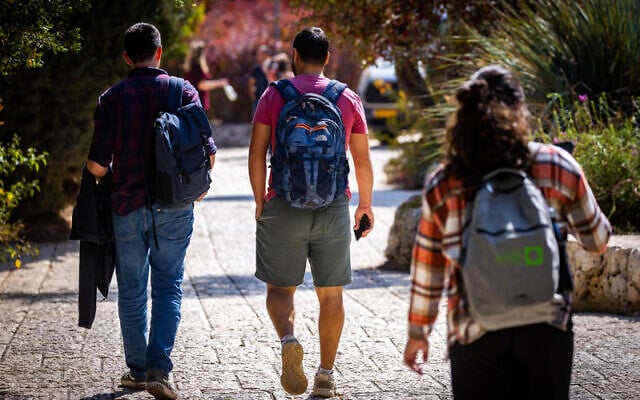Israel has the second-most crowded classrooms among OECD countries, after Chile, according to a study by the Organization for Economic Co-operation and Development (OECD)p ublished Monday.
Israel pays teachers close to the OECD average, although starting salaries are in the bottom third of countries, and it spends 24% of its per capita GDP on education, below the OECD average of 25.3%, the study found.
The latest figures showed that Israel’s average elementary school class size stood at 27 students in 2023 — unchanged from a decade earlier.
For middle school, class sizes have grown from 28 in 2013 to 30 in 2023.
The OECD noted that in most of its countries, the average class size in elementary schools was 21 students, and that all had fewer than 25, with the exceptions of Chile, Israel, Japan, and the United Kingdom.
Get The Times of Israel’s Daily Edition
by email and never miss our top stories
By signing up, you agree to the terms
According to an Education Ministry circular sent out in August last year, the maximum number of pupils allowed in a class was set at 34 for grades 1 to 7, 33 for grade 8, and 32 for grades 9 to 10.
The OECD’s annual ‘Education at a Glance’ report is considered the most comprehensive international comparison of education systems, covering access, outcomes, financing, and teaching conditions across the developed world. However, it does not examine the differences within the Israeli education system in terms of schools serving different sectors of the population.
Children arrive to their first day of school at the Gamla School in the northern Israeli town of Katzrin, on September 1, 2025 (Michael Giladi/Flash90)
Most of the underlying statistics are from 2022 or 2023, since these were the latest full datasets available when the report was compiled.
The report found that Israeli pupils received 941 hours of compulsory instruction per year in primary education and 1,002 hours in lower secondary education — above the OECD average of 804 hours in primary and 909 hours in lower secondary education.
It also said that 68% of the fully qualified teachers who resigned in 2022-23 had been in the profession for less than five years.
Israeli teachers demonstrate for better pay and conditions in Tel Aviv on May 30, 2022. The placard roughly translates as “Our sense of mission shouldn’t mean lousy conditions” (Tomer Neuberg/Flash90)
It spent $11,166 per student from primary to post-secondary non-tertiary levels in 2022, placing it in the middle of countries that were members or prospective members of the OECD. The sums spanned from less than $2,000 in Peru, an official candidate country for accession, to more than $27,000 in the case of Luxembourg.
At the tertiary level, Israel lagged behind other countries, spending an average of $7,311 per tertiary student compared to the OECD average of $15,102.
Students at the Mount Scopus campus of Jerusalem’s Hebrew University on the new school year, October 23, 2022. (Olivier Fitoussi/FLASH90)
Responding to the findings, Education Minister Yoav Kisch said that the ministry is working with the Finance Ministry and the Prime Minister’s Office “to re-examine the staffing model and [take] measures to reduce class sizes,” in order to address overcrowding and teacher burnout.
In other findings, the report said that the share of young Israeli adults (25-34-year-olds) without upper secondary education (available to ages 16 to 18) remained unchanged at 9% between 2019 and 2024, compared with an average of 13% OECD across the OECD.
Focusing this year on tertiary education and issues such as equality of access, the report revealed that only a quarter of Israeli graduates aged 25 to 34 years came from families where neither parent had completed high school education.
Education Minister Yoav Kisch at the Ministry of Education in Jerusalem, in preparation for the opening of the school year, August 31, 2025. (Chaim Goldberg/Flash90)
The figure for Israel (25.5%) is close to the OECD average of 25.6%.
Denmark had the highest percentage of students from such backgrounds out of 26 countries surveyed — 48.53% — while the Slovak Republic came in last with 2.83%. The figure for the US was 22.33%.
Among Israeli students, just under two-thirds (62.62%) had at least one parent with a high school education, which was below the OECD average of 69.7%.
“Unequal opportunities are holding back some learners who would benefit from a tertiary education,” the report said. “In all countries, children from disadvantaged backgrounds are far less likely to reach higher levels of education than those from more advantaged backgrounds.”
In Israel, 8% of 25-34-year-olds held a master’s or equivalent degree in 2023 — the same as in 2019, and far below the OECD average of 16%.
Israeli students in higher education also took longer to complete their first degrees than the OECD average, with just under eight out of ten having finished three years after the end of their courses.
Is The Times of Israel important to you?
If so, we have a request.
Every day, even during war, our journalists keep you abreast of the most important developments that merit your attention. Millions of people rely on ToI for fast, fair and free coverage of Israel and the Jewish world.
We care about Israel – and we know you do too. So today, we have an ask: show your appreciation for our work by joining The Times of Israel Community, an exclusive group for readers like you who appreciate and financially support our work.
Already a member? Sign in to stop seeing this
You appreciate our journalism

You clearly find our careful reporting valuable, in a time when facts are often distorted and news coverage often lacks context.
Your support is essential to continue our work. We want to continue delivering the professional journalism you value, even as the demands on our newsroom have grown dramatically since October 7.
So today, please consider joining our reader support group, The Times of Israel Community. For as little as $6 a month you’ll become our partners while enjoying The Times of Israel AD-FREE, as well as accessing exclusive content available only to Times of Israel Community members.
Thank you,
David Horovitz, Founding Editor of The Times of Israel
Already a member? Sign in to stop seeing this




